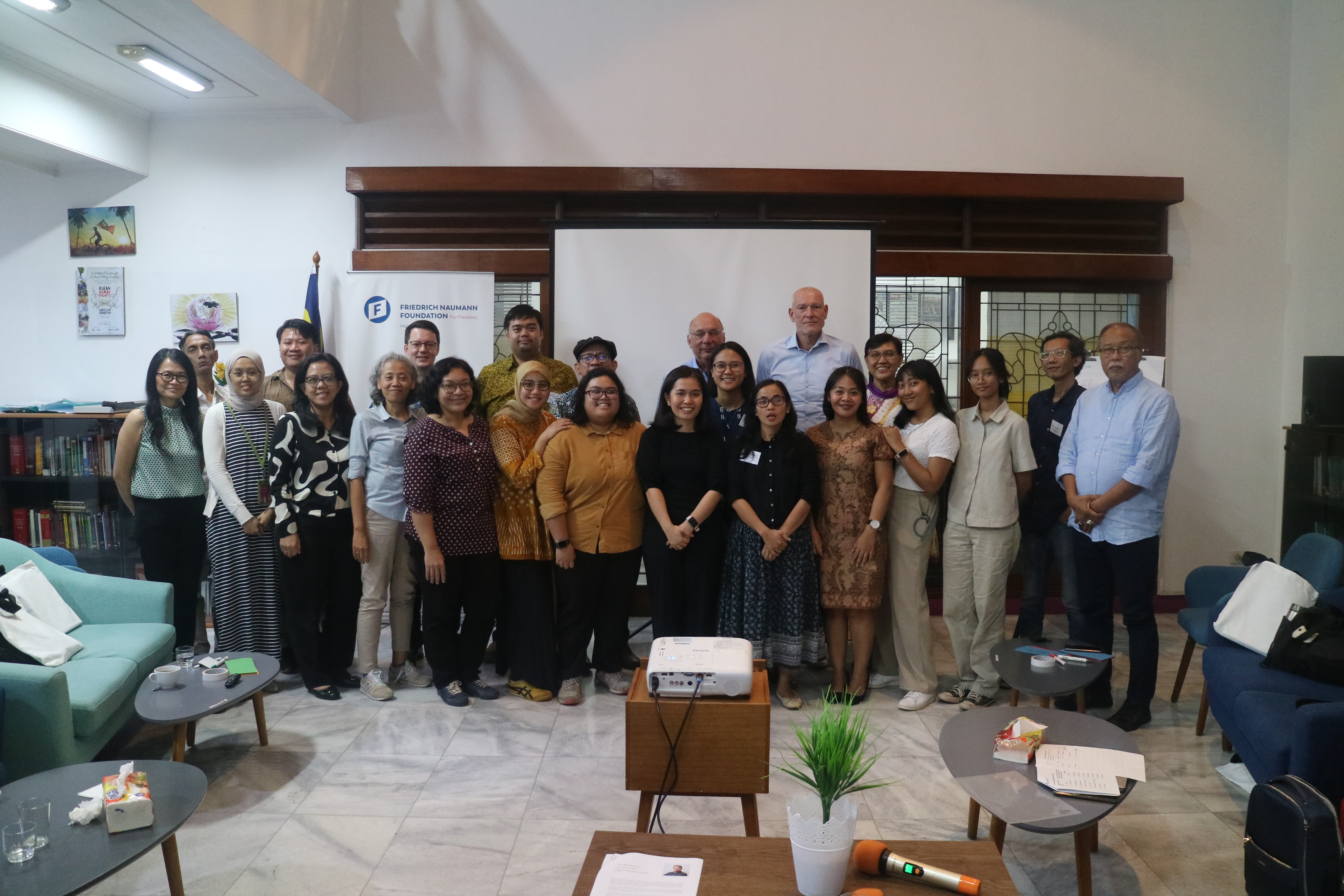Press Release
An Evening with FNF’s Civil Society Partners: The Future of Democracy in Indonesia

Dr. René Klaff (Head of International Department) and Moritz Kleine-Brockhoff (Head of Regional Office Southeast and East Asia) with FNF Jakarta staff and our local civil society partners.
© FNF IndonesiaOn September 9th, civil society partners of FNF Indonesia gathered for a networking event to have an exchange on the future of democracy in Indonesia. The event brought together voices from various sectors, all dedicated to exploring the challenges and opportunities facing Indonesia’s democratic landscape. The atmosphere was lively, filled with insightful exchanges on how to strengthen democratic institutions and promote civic engagement in the country.
Notably, Dr. René Klaff, the Head of the International Department of Friedrich Naumann Foundation, was present, offering his perspective on global democratic trends and the importance of international cooperation in bolstering democratic resilience. During his visit, he was accompanied by Moritz Kleine-Brockhoff, head of the FNF South East and East Asia Regional Office. In the course of the evening, partners and friends of FNF Indonesia contributed to a rich discussion about the future of Indonesia’s democracy and reflected upon the projects they have done with FNF.
The event started with the opening from FNF Indonesia Director, Dr. Stefan Diederich, introducing the topic of the ongoing complexities of democracy in Indonesia and the role of civil society in it. Afterwards, FNF Indonesia’s civil society partners such as, Center for Indonesian Policy Studies (CIPS), Serikat Jurnalis untuk Keberagaman (SEJUK), Lembaga Gerak Pemberdayaan (LestraGP), and Institut Demokrasi dan Kesejahteraan Sosial (INDEKS) introduced their respective organizations.

Representatives of CIPS with Moritz Kleine-Brockhoff.
© FNF IndonesiaThe focus of the ensuing discussion centred on the future of democracy in Indonesia. SEJUK expressed a concern that the limited scope for addressing sensitive topics in public forums might shrink even further in the years to come. SEJUK warned that the trend of liberal democracy being reversed in favour of populism is worrying, though they believed that with the right approach, the work of civil society partners could help mitigate these challenges. By carefully promoting liberal values without overtly naming them, they hope to navigate this delicate terrain while ensuring that civil liberties continue to be a priority.
LestraGP praised the way FNF’s intimate cooperation with local governments has advanced political education. This relationship has helped build FNF’s reputation as a trustworthy partner, especially due to its engagement with governmental bodies to educate citizens about politics. Remarking on FNF’s close cooperation with the Indonesian Ministry of Law and Human Rights, this collaboration exemplified how non-governmental organizations (NGOs) can work within the political system and public institutions of Indonesia to promote democratic principles.
CIPS, on the other hand, emphasized the importance of ensuring that civil society continues to stand firm in its support of democracy. They stressed the need for long-term commitment to political freedom, particularly for the younger generation, which might otherwise take this freedom for granted. As the political landscape grows increasingly uncertain, CIPS envisions the next decade as critical for safeguarding these freedoms. They remain optimistic but also realistic about the challenges ahead, calling for continued vigilance and proactive efforts to preserve the core principles of democracy.

An Evening with FNF’s Civil Society Partners
© FNF IndonesiaINDEKS stated that while Indonesia's democracy may be stronger than other Southeast Asian countries, there is still little optimism about its future trajectory. The steady decline of civil liberties each day signals troubling trends that raise doubts about the sustainability of its democratic values. Despite past strides toward greater freedom, Indonesia now faces an era where those hard-earned liberties are eroding, creating a sense of unease about what lies ahead for its democratic system.
Meanwhile, Moritz Kleine-Brockhoff expressed a cautiously optimistic outlook regarding Indonesia's future, acknowledging the significant challenges currently confronting the country's political system. He highlighted Indonesia's successful history of peaceful power transitions through elections as a positive development. However, he also notes the recent decline in the democracy index across Southeast Asia, pointing out that Indonesia is not immune to this trend. With the Constitutional Court's decisions under scrutiny and an impending leadership change, he raised concerns about the nation's trajectory. Despite these apprehensions, Moritz Kleine-Brockhoff believes that Indonesia possesses the resilience and potential to navigate these challenges effectively.

Ganes Woro Retnani (Program Officer, FNF Indonesia) with Representatives of INDEKS.
© FNF IndonesiaDr. René Klaff offered a comprehensive reflection on democracy, characterizing it as a powerful concept—so much so that even autocratic regimes strive to maintain the illusion of democratic decision-making for their citizens. He underscored that the essence of democracy resides in its normative function: to safeguard individual freedoms. He highlighted the critical role of elections as a mechanism for holding those in power accountable to the populace. While acknowledging that Indonesia's democracy has matured over six electoral cycles, he cautioned that elections alone are insufficient to secure the integrity of the system. For democracy to flourish, it must be actively protected and nurtured, with citizens demanding not only political freedom but also dignity. Drawing parallels with Europe, where populism poses a threat to democratic structures, he emphasized that Indonesia must also safeguard its democratic principles, rooted in the values of Pancasila and individual freedom.

Dr. René Klaff (Head of International Department, FNF) & Moritz Kleine-Brockhoff (Head, Regional Office Southeast and East Asia, FNF)
© FNF IndonesiaIn conclusion, Dr. Stefan Diederich highlighted the foundation's commitment to fostering strong relationships with civil society partners: “Events like ours tonight facilitate the creation of horizontal networks across civil society. These networks are essential for invigorating and sustaining democracy in Indonesia.” He emphasized that FNF Indonesia's initiatives aim to enhance societal welfare and individual well-being through the promotion of political awareness and active participation. By collaborating with local organizations, FNF Indonesia seeks to empower citizens to engage meaningfully in the democratic process, thereby fostering a more robust and inclusive political culture that ultimately benefits all Indonesians.



